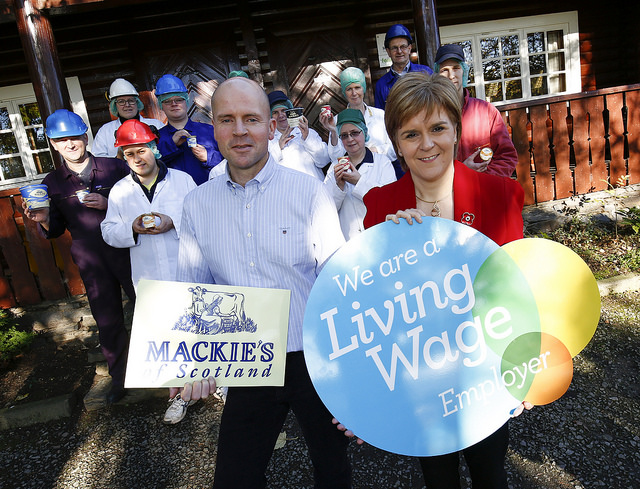Chip in to keep stories like these coming.
It was a misunderstanding on Twitter that made me realize just how global the living wage movement has become.
In Hamilton, a group of us were busy engaging local officials and the public on the benefits of a living wage when I saw a tweet from colleagues in British Columbia congratulating Hamilton city council on becoming a living wage employer.
Had I missed something? We were having productive conversations with our municipality, but as far as I knew city staff were still reviewing the policy implications of adopting a living wage for City of Hamilton employees. I was dumbstruck. Could a city council vote on living wage really have escaped my notice?
I looked at the tweet again and clicked the link.
Sure enough, Hamilton City Council did vote to adopt a living wage… Catch is: it wasn’t my Hamilton, it was our city’s namesake in an entirely different hemisphere: Hamilton, New Zealand.
The modern living wage movement started in Baltimore, Maryland in the early-1990s and has since spread across many countries. Living wage initiatives are particularly active in the English-speaking world.
In the United States, grassroots campaigns have focused on encouraging municipal governments to adopt living wage policy for both direct full- and part-time workers, as well as requiring companies that contract with the city to pay their employees a living wage.
Today, living wage ordinances cover more than 150 jurisdictions in the United States, including New York City, San Francisco, Chicago, Los Angeles and Seattle. In May, Los Angeles City Council voted to increase its minimum wage from $9 per hour to $15 per hour.
New York City’s living wage procurement policy will impact 18,000 low-wage workers. As New York Mayor Bill de Blasio noted last September: “We cannot continue to allow rampant and growing income inequality. Every tool counts.”
In the United Kingdom, London Citizens, a non-governmental, grassroots organization, launched the Living Wage Foundation in 2001. Led by a group of parents in the East End of London, the Living Wage Foundation found success in engaging private sector employers who were committed to the moral and business value of adopting living wages for their employees.
Nearly 2,000 large and small British employers including furniture retailer IKEA, food giant Nestle, financial services employer KPMG and the Chelsea Football Club are accredited living wage workplaces.
Scotland’s living wage campaign has focused on engagement of public sector employers. Through the leadership of anti-poverty organizations and Scotland’s labour movement, most public sector employers in Scotland: universities, school boards and local authorities are now accredited living wage employers, including the Scottish parliament.
The Aotearoa (New Zealand) Living Wage campaign launched in 2013 and the Republic of Ireland calculated a living wage in 2015.
Living wage initiatives are quickly emerging in Canada.
New Westminster, British Columbia, became Canada’s first living wage municipality in 2011 and Vancouver City Council has recently supported Mayor Gregor Robertson’s motion to make that city a living wage employer as well.
In the last few months, groups in Halifax, Saskatoon, and Yellowknife have launched living wage initiatives, supported by Canadian Centre for Policy Alternatives offices across the country as well as through Vibrant Communities Canada, which hosts the Living Wage Canada website.
In Ontario, more than 20 communities are now actively engaged in living wage initiatives. We’re not alone in this journey and there is a lot to learn from one another.
Last year, I had the chance to visit Scotland. And you know what? There’s a place called Hamilton there too — and they’re also working on living wage initiatives. I took the 20-minute train ride from Glasgow to South Lanarkshire and visited my living wage counterparts in the town of Hamilton, population 40,000.
It was an interesting and educational visit. We thought it would be a good idea to stay connected, so last November, with the help of our local CBC station, we held our first three-way Hamilton living wage video conference.
Workers in Scotland, New Zealand and Canada face similar challenges: full-time jobs are hard to come by, scheduling is erratic and wages are often too low. The living wage isn’t a cure-all, but across the globe it is one important way in which progressive employers and communities can help stem the tide of low-wage work and help build a healthier local economy that works for everybody.
Back in Hamilton, Ontario, my city is still examining the living wage as a municipality. Our public school board has taken the first step: it is the largest public school board in Canada to become a living wage employer.
We’re proud to be part of a growing global movement.
Tom Cooper is coordinator of the Ontario Living Wage Network and director of the Hamilton Poverty Reduction Roundtable. Follow Tom on Twitter: @TomCoopster and follow the Ontario Living Wage Network on Twitter: @OnLivingwage
Photo: First Minister of Scotland/flickr
Chip in to keep stories like these coming.




